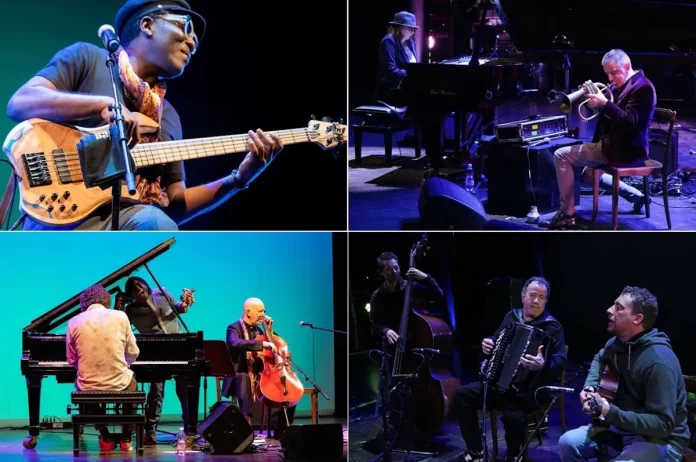
Bergamo was back to its accustomed format and excellence, following the pandemic.
A highlight of the events at the main evening venue, Teatro Donizetti, was the duo of Paolo Fresu and Rita Marcotulli, who performed poetic improvisations with an Italian feel, and most pieces in a minor key. Fresu played trumpet and flugelhorn, with gentle and restrained electronic effects; Marcotelli is one of the remarkable number of excellent Italian jazz pianists. The plangent Terra Mia – I think that’s the title – was a highlight. As an encore, the duo performed a tender, affecting interpretation of Charlie Haden’s beautiful Nightfall, with subtle harmonising and echo on trumpet. A magical concert.
The Panorchestra, also at Teatro Donizetti, were led by veteran saxophonist Tino Tracanna. The large ensemble of mainly Italian players hails from the three cities Milan-Bergamo-Brescia that currently form Italy’s city of culture. The event featured American special guest Jonathan Finlayson on trumpet, in brassy splendour. Many of the excellent arrangements were by pianist Alfonso Santimone, and they were distinctive and sometimes quirky. The highlight was a tango-ish arrangement by Finlayson, that featured a long, fiery solo from him.
In complete contrast was the trio of Ernst Reijseger (cello), Harmen Fraanje (piano) and Mola Sylla (vocals, little instruments) at Teatro Sociale in the upper town. They formed a trio of Dada freedoms, making music from scraps of material, sounds and gestures. Cod-classicism, absurdism and irony were the order of the day. Festival director Maria Pia di Vito joined them for several numbers. She is a vocalist who understands vocalists, and a central theme of the festival was the variety that she promotes. Fraanje offered Bachian passages on piano, and in the concluding piece, piano and cello played quiet, Philip Glass-like arpeggios, before the vocalist bawled into the piano interior. Sylla had clearly picked up the dominant absurdist Dutch humour.
David Linx is, for me, a more problematic artist. You could think of him as a Belgian Bobby McFerrin – a stunning and consummate vocal technician who works across vocalese, scat and lyrics – that is, no words, made-up words and real words. He’s a remarkable singer and his material is plangent. As accompanist the singer had a great pianist, Leonardo Montana, from La Paz, Peru. But I’m not totally convinced by Linx’s aesthetic, with its juxtaposition of vocalese, scat and lyrics. There were powerful interpretations of a tribute to Toni Morrison, and a moving bluesy/spiritual composition.
For the final concert we returned to Teatro Donizetti, and two Richards. The first set was by Richard Galliano, creator of the new musette and new tango. It’s very French, and almost too beautiful. The accordionist’s trio featured Diego Imbert (string bass) and Adrien Moigard (amplified acoustic guitar), and they helped create something of a Hot Club aura. At first it seemed like bass and guitar were just accompanists, but they did eventually get to solo. Highlights included atmospheric interpretations of two of Satie’s Gymnopédies. The accordion-playing was reminiscent of Galliano’s mentor Astor Piazzolla, and also Dino Saluzzi. Galliano also played mouth organ, on Moon River and the second encore Autumn Leaves; his first encore featured the smaller bandoneon. The audience loved it – as indeed did I.
Electric bassist Richard Bona’s trio featured Basque guitarist Sylvain Luc and Nicolas Viccaro on drums. Bona is from Cameroun, French central Africa, and comes from a griot family. He’s worked with a wide range of artists including Harry Belafonte, Jaco Pastorius, Joe Zawinul and Branford Marsalis. He has a sweet, plaintive singing voice. Before playing, he asked the sound desk to lower the volume for a more acoustic-sounding mix and, after further discussion, that is what he got. There was a quiet intensity to most of the pieces, rising occasionally to a more forceful intensity. A splendid set that concluded a superb festival.















